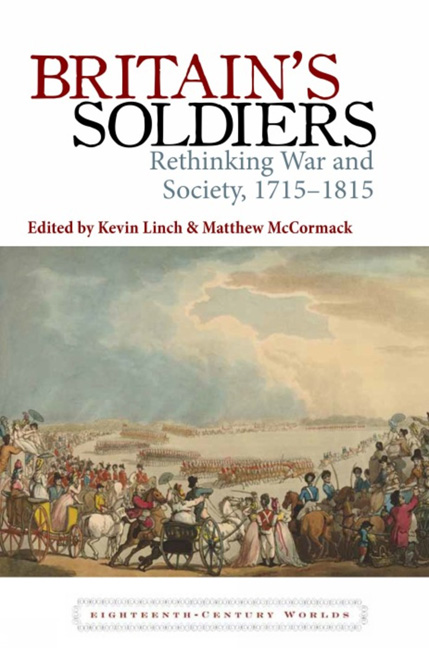Book contents
- Frontmatter
- Contents
- List of tables and figures
- Acknowledgements
- Notes on the contributors
- Introduction
- Part 1 Nationhood
- 1 The Eighteenth-Century British Army as a European Institution
- 2 Soldiering Abroad: The Experience of Living and Fighting among Aliens during the Napoleonic Wars
- Part 2 Hierarchy
- Part 3 Discipline
- Part 4 Gender
- Part 5 Soldiers in Society
- Index
1 - The Eighteenth-Century British Army as a European Institution
from Part 1 - Nationhood
- Frontmatter
- Contents
- List of tables and figures
- Acknowledgements
- Notes on the contributors
- Introduction
- Part 1 Nationhood
- 1 The Eighteenth-Century British Army as a European Institution
- 2 Soldiering Abroad: The Experience of Living and Fighting among Aliens during the Napoleonic Wars
- Part 2 Hierarchy
- Part 3 Discipline
- Part 4 Gender
- Part 5 Soldiers in Society
- Index
Summary
THE MOST DIFFICULT IDEAS to challenge are often those that are not explicitly articulated, but operate at the subterranean level of deep-rooted assumption. For all the recent emphasis on the need to free ourselves from the distortions of the narrowly national narrative, and recognise the intertwined, entangled, transnational, or even plain old-fashioned international dimensions of every society's past, the default setting for most historians seems to be the national perspective. Armies are perhaps particularly prone to this national approach. We tend to associate them with the nation state, national sentiment, and national identity. They act, especially in wartime, as a symbol of the nation. Historians of the British Army, over many generations, have reflected the general tendency to regard the British state's professional military forces as the embodiment of the nation and therefore as distinct and different from those of other states and nations.
Yet in the eighteenth century, at least, the British Army was as much a European as a British institution. It had much in common with, and was closely connected to, other European armies. Furthermore, in the right circumstances, its officers and men had little difficulty in appreciating their army's essential Europeanness. Unlikely though it may seem, we can even say that British soldiers possessed a European consciousness, based on occupational solidarity, which sat alongside their other senses of collective belonging. This chapter focuses mainly on the period 1740–93; from the middle of the eighteenth century until the time when Britain became involved in the French Revolutionary War. The case for the British Army's European character would probably be no less strong if earlier decades were examined. Recent work suggests that the argument may also hold good for the years after 1793.
Two important caveats need to be registered before the army's European features are analysed. The first is that the British military had some undeniably distinctive characteristics. Its control by the civil power, while not perhaps as absolute as some accounts suggest, marks it out from other European armies, many of which were clearly not constrained by constitutional limitations. From the middle of the century, the British Army was also more obviously committed to imperial theatres than most of its European counterparts…
- Type
- Chapter
- Information
- Britain's SoldiersRethinking War and Society, 1715–1815, pp. 17 - 38Publisher: Liverpool University PressPrint publication year: 2014



